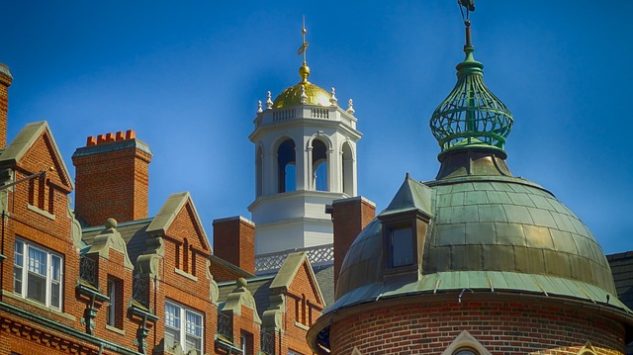Issue Briefs

Stinking City on a Garbage Dump
July 31, 2019
By Martin Hutchinson
Harvard University last week rescinded its acceptance of Parkland-shooting survivor Kyle Kashuv on the grounds of offensive tweets made when he was 16. This resulted in considerable media criticism that, in imposing political correctness codes and denying free speech, Harvard was betraying its beliefs. But that is nonsense. Harvard was founded in the Massachusetts Bay Colony in 1636. Bigoted small-minded intolerance and persecution of dissidents are central to its founding traditions.
Shining city on a hill?
One of President Ronald Reagan’s most implausible flights of rhetoric was his frequent invocation of Massachusetts Bay Colony founder John Winthrop’s aim to create a “shining city on a hill.” To me, this made very little sense as an aspiration for Americans in the modern age. Indeed, 1630s Boston was not a place in which you would have wanted to live.
Winthrop’s Massachusetts Bay Colony had very few of the freedoms for which the United States would later become famous. Religious dissidents were either expelled from the colony, or, in the case of a few unlucky Quakers, hanged. People could be and were prosecuted for smoking tobacco, profane dancing and sleeping in church. 31 people were executed for witchcraft over the course of the 17th Century, including but not limited to the notorious 1692 Salem Witch Trials. Those executed included the unfortunate Congregationalist minister George Burroughs, who was gender-inappropriately hanged for witchcraft so the locals didn’t have to pay the tithes that supported his church. Finally, the Massachusetts Bay Colony was the first in North America to institute slavery in its legal code.
Intolerance and cruelty at Harvard
Harvard University was an enthusiastic participant in the Massachusetts Bay Colony’s intolerance and cruelty. The University’s President for 20 years (1681-1701) was Increase Mather, whose 1684 book “Remarkable Providences” proclaimed the reality of witchcraft, quoting liberally from the Catholic witchcraft handbook “Malleus Malificarum” (thus showing his ecumenism in this area) and inspired the Salem trials, which were directly encouraged by his son Cotton Mather. It should be noted that witchcraft trials had more or less died out in the civilized parts of Europe, including Britain, by this time; Malleus Malificarum having been written as long previously as 1487.
No renaissance
The early Harvard, therefore, was not a place of renaissance of ancient learning and formation of new science, like Oxford, Cambridge or Bologna. It was a place of stultifying religious conformity and utter intolerance of dissent. We should thus not be surprised that today’s Harvard follows its own early traditions, rather than those of more broad-minded European seats of learning.
The Enlightenment came late at Harvard
The Enlightenment, with its moderation, skepticism, tolerance and enthusiasm for new ideas, came very late to the Harvard community. It is now clear that in some respects it never really arrived. This lack shows itself in many ways; if you have Increase Mather managing your endowment, he will lack intellectual flexibility and you must expect to underperform seriously the Standard and Poor’s 500 Index.
The continuing influence of 17th Century Puritanism explains much that is otherwise inexplicable about American history. One understands why Thomas Jefferson chose independence in 1776, and Washington appears to have been subjected in early life to stultifying British Army snobbery that was intolerable to him as a Virginia gentleman. However, it was never clear why the conservative and rationalist John Adams should choose to overthrow the established order as he did – until you realize that he was brought up among 17th Century Puritans, and thereby hated both the Church of England and still more the ecumenical tolerance of Catholicism demonstrated by the 1774 Quebec Act. Even in Adams, a civilized and moderate man who would be much liked by George III when he was Ambassador to London after the war, Winthrop’s intolerant Boston was present to warp his judgement.
The intolerance of Winthrop’s Boston
The intolerance of Winthrop’s Boston survives in today’s world, but it is aggressively secular. That does not mean it is rationalist. Indeed, the left believes in global warming just as strongly as Increase Mather believed in witchcraft, with just as little evidence. Colleges, and Harvard in particular, no longer select on merit but using all kinds of diversity algorithms, whose reinforcement of existing prejudice would be highly recognizable to Increase Mather, even if he would find their precise motivations peculiar.
In the business world also, we have lost our core belief in free speech, with Google, Facebook and the like indulging in censorship that would be highly familiar to the Puritans. Indeed, the concept of “virtue signaling,” apparently so modern, would be immediately recognizable to 1630s New Englanders, who indulged in it throughout their lives in an attempt to convince their neighbors and the Almighty of their intrinsic godliness.
Back to the old morals?
A return to the morals of 1630s Boston might improve some of the pathologies inherent in our society – it would do wonders for the illegitimacy rate, for example. 17th Century Bostonians’ aversion to debt would also be a useful addition to our modern economy – why can’t we keep the useful beliefs of such societies? However, 1630s Boston’s speech codes will do nothing for our society’s ability to make economic progress. That coveted progress depends on deep scientific knowledge, sparks of inventiveness, an ability to “think outside the box” and a willingness to take risks. None of those attributes were present in 1630s Boston, although the social risk-aversion of that society might be thought a compensation for the risks most of them had taken in crossing the Atlantic to a New World.
Modern America was built on the values of the Enlightenment
The United States was built on the rationalist values of the Enlightenment. At the end of the 18th Century; 1630s Boston was only an unfortunate memory in a small part of the country, and of declining importance as the country expanded. Far from adopting the values of 1630s Boston as the politically correct are now doing, we should reject them and return to the open, free-speaking society that is the best American tradition. In that way, both social and intellectual diversity will be accommodated, and the intellectually eccentric will be as encouraged to achieve their potential as are the economically disadvantaged and those from minority populations.
Kyle Kashuv is clearly an intelligent and articulate young man with a bright future. For his college career, I would recommend he consider my own alma mater of Trinity College, Cambridge. While he will find a generally leftist worldview there, as in all colleges today, the stultifying politically correct censorship of Harvard is absent.
Cambridge suffered only partial doses of the Puritan narrow-mindedness and bigotry universal in 1630s Boston, and shortly after that time matriculated Isaac Newton, an intellect of a quality that Harvard has yet to produce. Oh, and it doesn’t hurt that it’s considerably cheaper than Harvard.
This article was originally published on the True Blue Will Never Stain http://www.tbwns.com
The views and opinions expressed in this issue brief are those of the author.
 |
Martin Hutchinson is a GPI Fellow. He was a merchant banker with more than 25 years’ experience before moving into financial journalism. Since October 2000 he has been writing “The Bear’s Lair,” a weekly financial and economic column. He earned his undergraduate degree in mathematics from Trinity College, Cambridge, and an MBA from Harvard Business School. |